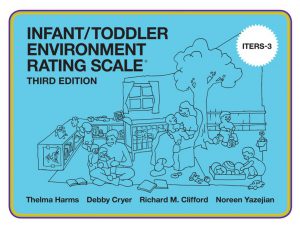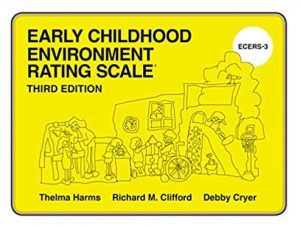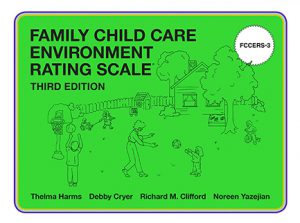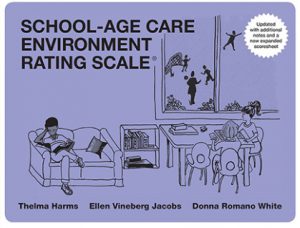Environment Rating Scales
The Environment Rating Scales (ERS) are an observational assessment that assess the process quality of a program. Process quality is what the children are directly experiencing in their program and how it has a direct effect on their development. There are 4 (four) different tools that are used in the ERS: the Infant and Toddler Environment Rating Scale (ITERS), the Early Childhood Environment Rating Scale (ECERS), the Family Child Care Environment Rating Scale (FCCERS) and the School Age Care Environment Rating Scale (SACERS). All 4 (four) of the scales are set up the same way to make learning the different scales easier, but the content in each scale is based off of the age group that the scale was created for.
History of the ERS:
- The original Early Childhood Environment Rating Scale (ECERS) was created in 1980
- The Family Day Care Rating Scale was created in 1989
- The Infant and Toddler Environment Rating Scale was created in 1990
- The School Age Care Environment Rating Scale was created in 1996

Learn More About ERS with Child Care Aware of NH
If you are interested in finding more about the Environment Rating Scales, consider applying to be a part of Virtual TA Cohorts, take an Intro and Overview of the ERS Training or apply for a Progressive Training and TA Program option.
- ERS Virtual TA Cohorts: Participants have the opportunity to collaborate with peers, as they obtain resources and support through professional development and technical assistance in a cooperative group setting. Cohorts have specific application periods where you can sign up.
- Intro and Overview of the Environment Rating Scales Trainings: This training is an introduction and overview of the Environment Rating Scales. The training will provide basic information on the Environment Rating Scales, how to use the tools and the benefits of using the tools in your classrooms and program. This ERS training is being offered multiple days and times in order for you to select one (1) date and time that is most convenient.
- Progressive Training and TA Program: Programs an opportunity to participate in focused and facilitated training and technical assistance. Progressive programs receive individualized technical assistance to improve program quality.
You can contact Child Care Aware of NH by phone at 1-855-393-1731 ext. 2526 or ext. 2532, or by email at [email protected] to receive the tools.
Community of Practice (CoP): Beyond the Intro & Overview of ERS
A Community of Practice (CoP) is a group of like-minded individuals who share a common interest or experiences. They come together to learn from each other, collaborate, and deepen their knowledge in a specific area. Child Care Aware of NH’s Beyond the Intro & Overview of ERS focuses on enhancing childcare environments using Environment Rating Scales (ERS). Our CoP is a supportive network where child care providers like you can connect, share experiences, and gain a deeper understanding of ERS. By being part of this community, you’ll benefit from collaborative learning, insights, and practical tips for improving your childcare setting using ERS.
Upcoming Intro and Overview of the Environment Rating Scales (ERS) Training Opportunities
Time: 12:30-2:00 PM (Thursdays) | Time: 6:00-7:30 PM (Tuesdays) |
|---|---|
March 14, 2024 | March 26, 2024 |
April 11, 2024 | April 23, 2024 |
May 9, 2024 | May 21, 2024 |
June 13, 2024 | June 25, 2024 |
Upcoming CoP: Beyond the Intro & Overview of ERS Training Opportunities
The next Community of Practice: Beyond the Intro & Overview of ERS will be held on Tuesday, April 30, 2024, from 6:00-7:30 PM. You can register in your NHCIS account.
Infant and Toddler Environment Rating Scale-Third Edition (ITERS-3)

ITERS-3: Designed to use with one class at a time with the majority of children (75%) between the ages birth through 3 (three) years. There are 33 (thirty three) items that are included in this tool. These items are organized into 6 (six) different subscales based on what is most likely to be found under similar circumstances. The subscales for ITERS are: Space and Furnishings, Personal Care Routines, Language and Books, Activities, Interaction and Program as well as Structure.
Early Childhood Environment Rating Scale-Third Edition (ECERS-3)

ECERS-3: Designed to be used with one classroom at a time with the majority of the children (75%) between the ages of 3 (three) to 5 (five) years. There are 35 (thirty five) items that are included in this tool. These items are organized into 6 (six) different subscales based on what is most likely to be found under similar circumstances. The 6 (six) subscales are Space and Furnishings, Personal Care Routines, Language and Literacy, Learning Activities, Interaction and Program as well as Structure.
Family Child Care Environment Rating Scales-Third Edition (FCCERS-3)

FCCERS-3: Designed to be used in one family child care home at a time with children between the ages of birth through 12 (twelve) years. There are 33 (thirty three) items that are included in this tool. These items are organized into 6 (six) different subscales based on what is most likely to be found under similar circumstances. The subscales for FCCERS are: Space and Furnishings, Personal Care Routines, Language and Books, Activities, Interaction and Program as well as Structure.
School-Aged Care Environment Rating Scale-Updated Edition (SACERS-U)

SACERS-U: Designed to be used in an afterschool program with children ages 5 (five) though 12 (twelve) years. There are 47 (forty seven) items that are included in this tool. Theses are organized into 7 (seven) different subscales based on what is most likely to be found under similar circumstances. The subscales for SACERS are: Space and Furnishings, Health and Safety, Activities, Interactions, Program Structure, Staff Development and Special Needs Supplementary Items.

Ways to Learn More About the Environment Rating Scales
- Environment Rating Scales Institute: You will find additional resources and more information about each of the tools. https://www.ersi.info/index.html
- Kaplan Early Learning Company: You can find and order ERS tools and additional materials. Kaplan also has class lists of materials based on the different ERS Tools.
- Teachers College Press: You can find and order the ERS Tools and any additional materials.
- Supplementary Materials:
- Coaching with the ECERS by Holly Seplocha
- All About the ECERS-3 by Debby Cryer, Cathy Riley and Tracy Link
